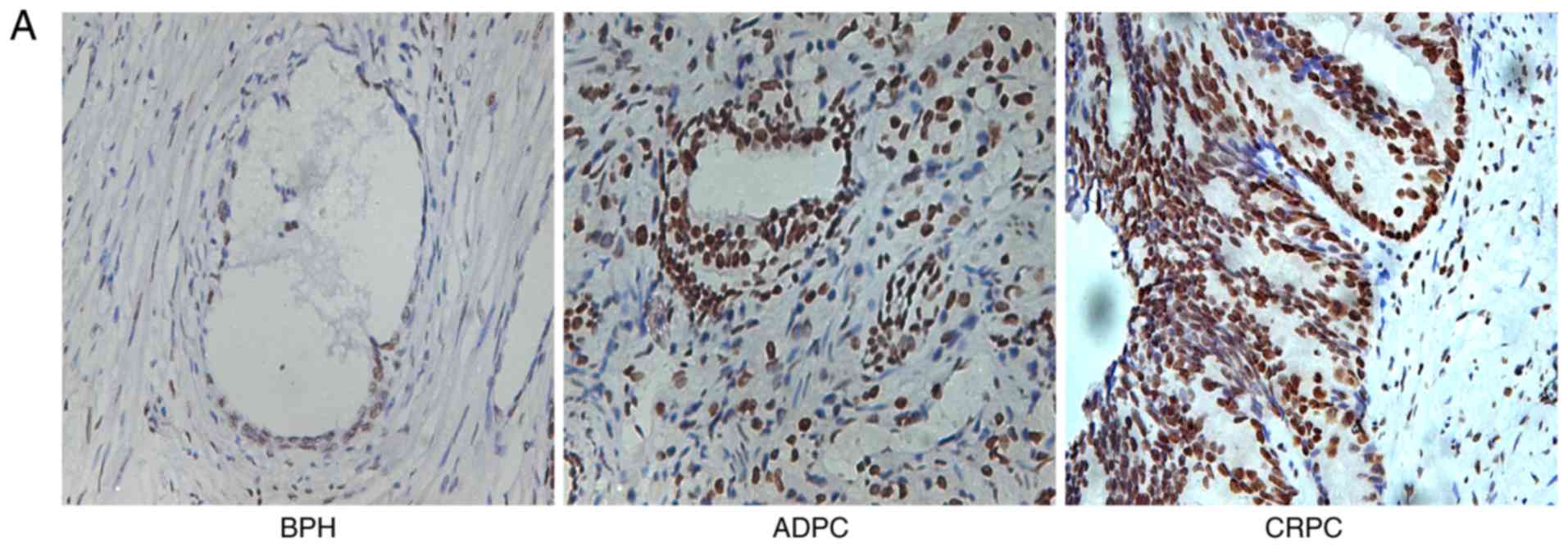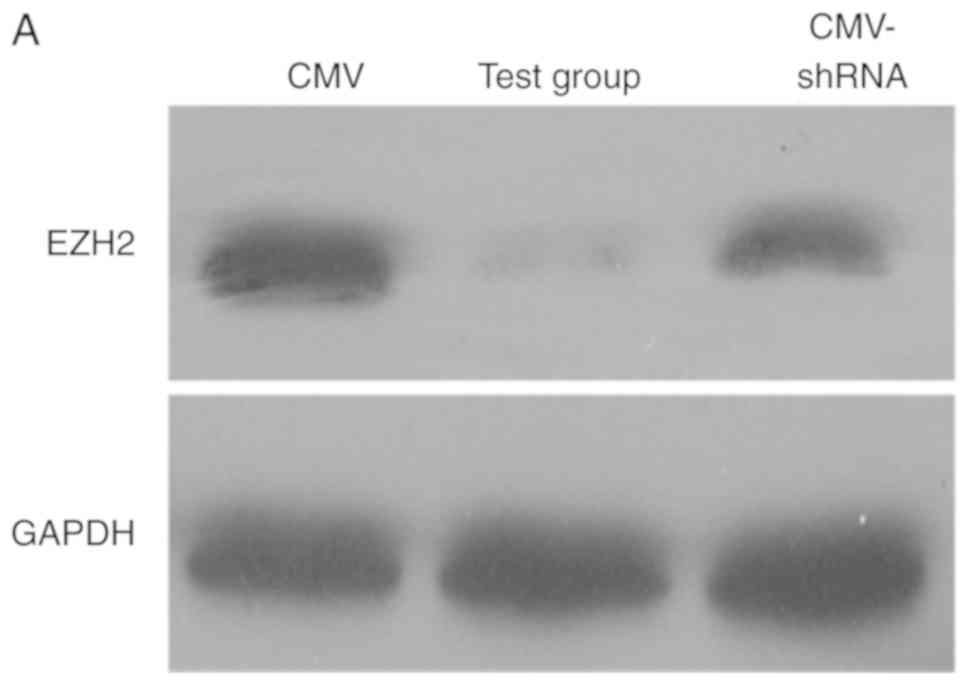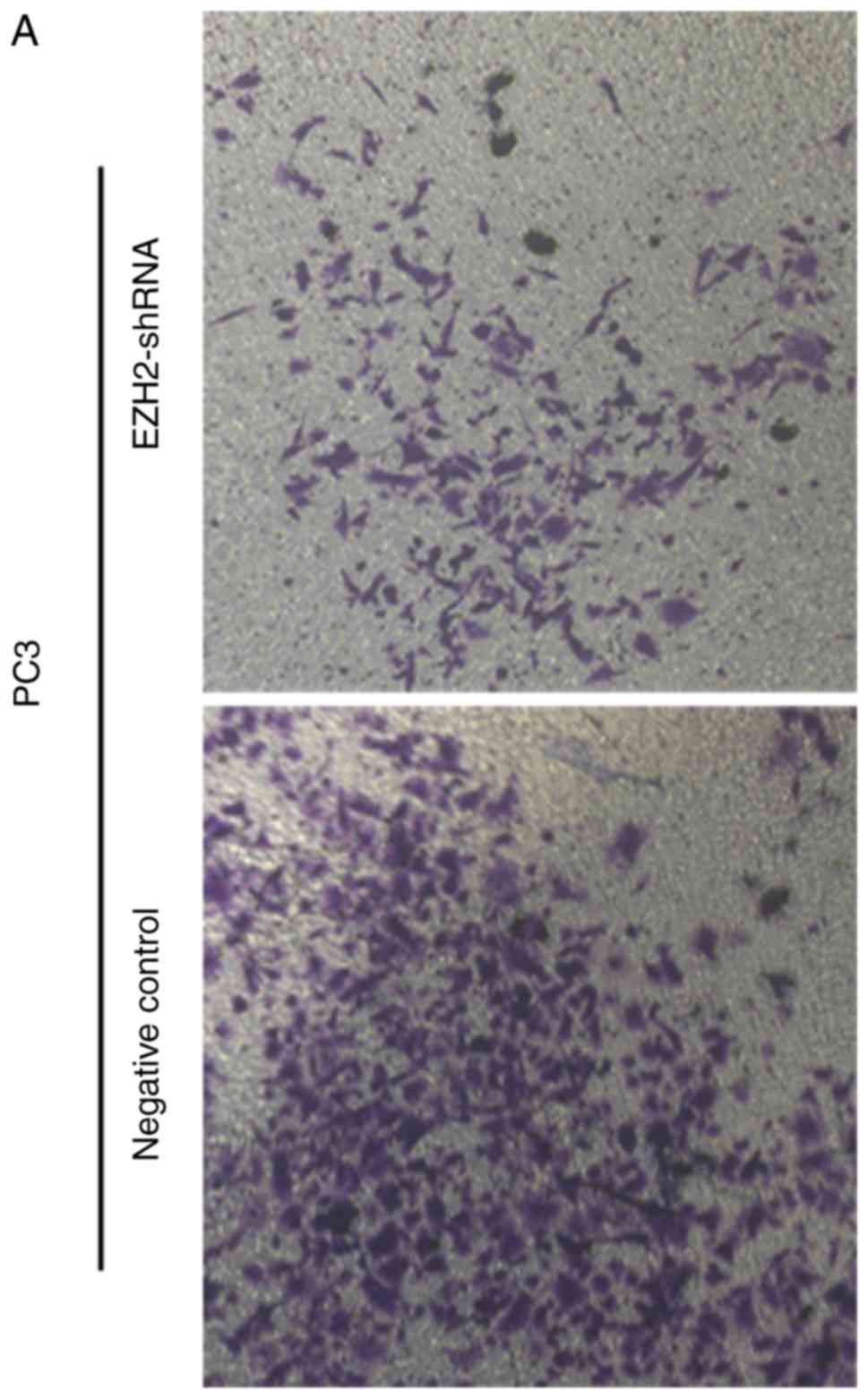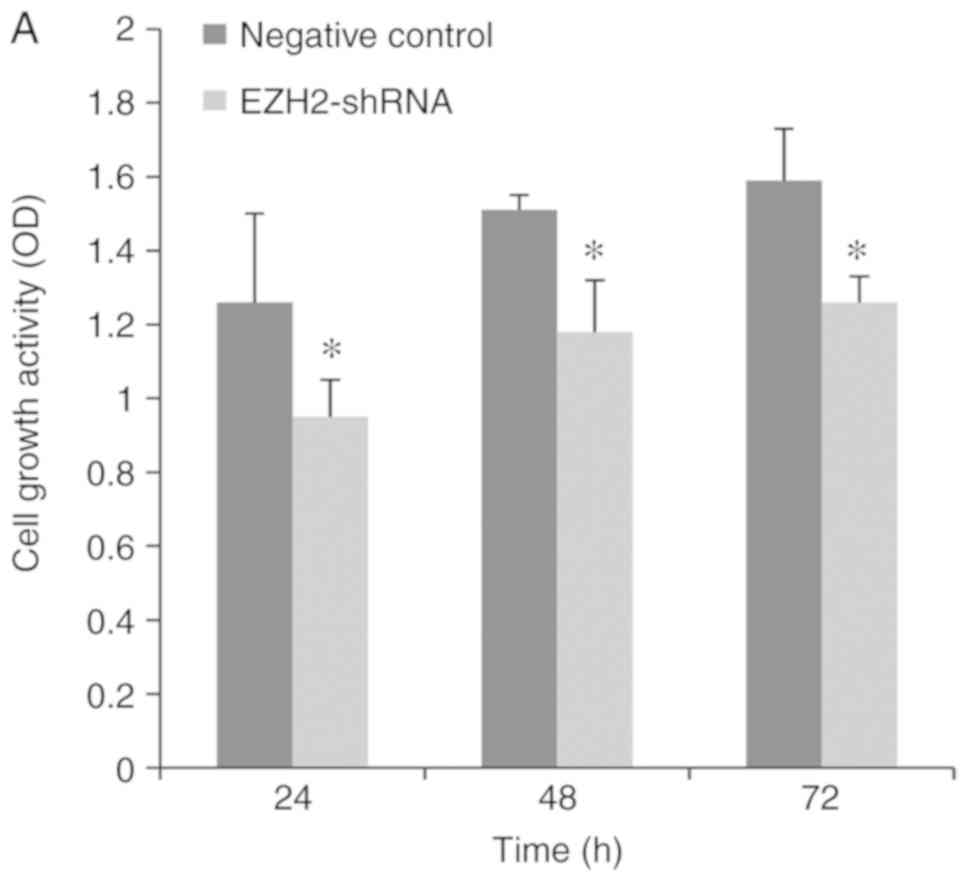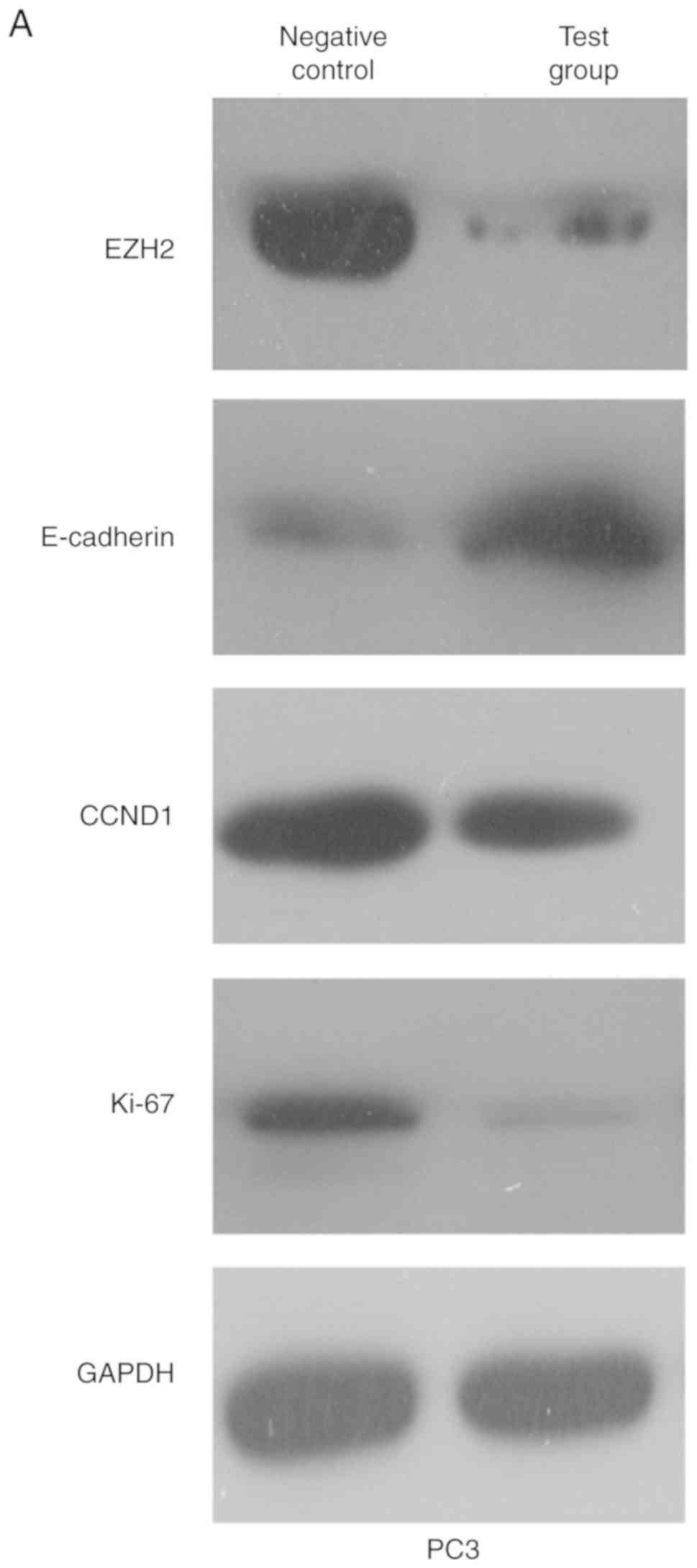|
1
|
Siegel RL, Miller KD and Jemal A: Cancer
statistics, 2018. CA Cancer J Clin. 68:7–30. 2018. View Article : Google Scholar : PubMed/NCBI
|
|
2
|
Klil-Drori AJ, Tascilar K, Yin H, Aprikian
A, Bitton A and Azoulay L: Androgen deprivation therapy and the
incidence of inflammatory bowel disease in patients with prostate
cancer. Am J Epidemiol. 184:15–22. 2016. View Article : Google Scholar : PubMed/NCBI
|
|
3
|
Massard C and Fizazi K: Targeting
continued androgen receptor signaling in prostate cancer. Clin
Cancer Res. 17:3876–3883. 2011. View Article : Google Scholar : PubMed/NCBI
|
|
4
|
Irving J, Wang Z, Powell S, O'Sullivan C,
Mok M, Murphy B, Cardoza L, Lebkowski JS and Majumdar AS:
Conditionally replicative adenovirus driven by the human telomerase
promoter provides broad-spectrum antitumor activity without liver
toxicity. Cancer Gene Ther. 11:174–185. 2004. View Article : Google Scholar : PubMed/NCBI
|
|
5
|
Cao Q, Yu J, Dhanasekaran SM, Kim JH, Mani
RS, Tomlins SA, Mehra R, Laxman B, Cao X, Yu J, et al: Repression
of E-cadherin by the polycomb group protein EZH2 in cancer.
Oncogene. 27:7274–7284. 2008. View Article : Google Scholar : PubMed/NCBI
|
|
6
|
Liu L, Xu Z, Zhong L, Wang H, Jiang S,
Long Q, Xu J and Guo J: Enhancer of zeste homolog 2 (EZH2) promotes
tumour cell migration and invasion via epigenetic repression of
E-cadherin in renal cell carcinoma. BJU Int. 117:351–362. 2016.
View Article : Google Scholar : PubMed/NCBI
|
|
7
|
Lobo J, Rodrigues Â, Antunes L, Graça I,
Ramalho-Carvalho J, Vieira FQ, Martins AT, Oliveira J, Jerónimo C
and Henrique R: High immunoexpression of Ki67, EZH2, and SMYD3 in
diagnostic prostate biopsies independently predicts outcome in
patients with prostate cancer. Urol Oncol. 36:161.e167–161.e117.
2018. View Article : Google Scholar
|
|
8
|
Kim KH and Roberts CW: Targeting EZH2 in
cancer. Nat Med. 22:128–134. 2016. View
Article : Google Scholar : PubMed/NCBI
|
|
9
|
Xu K, Wu ZJ, Groner AC, He HH, Cai C, Lis
RT, Wu X, Stack EC, Loda M, Liu T, et al: EZH2 oncogenic activity
in castration-resistant prostate cancer cells is
Polycomb-independent. Science. 338:1465–1469. 2012. View Article : Google Scholar : PubMed/NCBI
|
|
10
|
Varambally S, Dhanasekaran SM, Zhou M,
Barrette TR, Kumar-Sinha C, Sanda MG, Ghosh D, Pienta KJ, Sewalt
RG, Otte AP, et al: The polycomb group protein EZH2 is involved in
progression of prostate cancer. Nature. 419:624–629. 2002.
View Article : Google Scholar : PubMed/NCBI
|
|
11
|
Xiang S, Zou P, Tang Q, Zheng F, Wu J,
Chen Z and Hann SS: HOTAIR-mediated reciprocal regulation of EZH2
and DNMT1 contribute to polyphyllin I-inhibited growth of
castration-resistant prostate cancer cells in vitro and in vivo.
Biochim Biophys Acta Gen Subj. 1862:589–599. 2018. View Article : Google Scholar : PubMed/NCBI
|
|
12
|
Laitinen S, Martikainen PM, Tolonen T,
Isola J, Tammela TL and Visakorpi T: EZH2, Ki-67 and MCM7 are
prognostic markers in prostatectomy treated patients. Int J Cancer.
122:595–602. 2008. View Article : Google Scholar : PubMed/NCBI
|
|
13
|
Gu X, Gao XS, Bai Y, et al: EZH2
overexpression as a biomarker of poor prognosis in prostate cancer.
2016.
|
|
14
|
Cao P, Deng Z, Wan M, Huang W, Cramer SD,
Xu J, Lei M and Sui G: MicroRNA-101 negatively regulates Ezh2 and
its expression is modulated by androgen receptor and
HIF-1alpha/HIF-1beta. Mol Cancer. 9:1082010. View Article : Google Scholar : PubMed/NCBI
|
|
15
|
Wirth T, Zender L, Schulte B, Mundt B,
Plentz R, Rudolph KL, Manns M, Kubicka S and Kühnel F: A
Telomerase-dependent conditionally replicating adenovirus for
selective treatment of cancer. Cancer Res. 63:3181–3188.
2003.PubMed/NCBI
|
|
16
|
Kirch HC, Ruschen S, Brockmann D, Esche H,
Horikawa I, Barrett JC, Opalka B and Hengge UR: Tumor-specific
activation of hTERT-derived promoters by tumor suppressive
E1A-mutants involves recruitment of p300/CBP/HAT and suppression of
HDAC-1 and defines a combined tumor targeting and suppression
system. Oncogene. 21:7991–8000. 2002. View Article : Google Scholar : PubMed/NCBI
|
|
17
|
Liu L, Liu Y, Zhang T, Wu H, Lin M, Wang
C, Zhan Y, Zhou Q, Qiao B, Sun X, et al: Synthetic Bax-Anti Bcl2
combination module actuated by super artificial hTERT promoter
selectively inhibits malignant phenotypes of bladder cancer. J Exp
Clinl Cancer Res. 35:32016. View Article : Google Scholar
|
|
18
|
Cebrià F, Kobayashi C, Umesono Y, Nakazawa
M, Mineta K, Ikeo K, Gojobori T, Itoh M, Taira M, Sánchez Alvarado
A and Agata K: FGFR-related gene nou-darake restricts brain tissues
to the head region of planarians. Nature. 419:620–624. 2002.
View Article : Google Scholar : PubMed/NCBI
|
|
19
|
Sanger F, Nicklen S and Coulson AR: DNA
sequencing with chain-terminating inhibitors. Proc Natl Acad Sci
USA. 74:5463–5467. 1977. View Article : Google Scholar : PubMed/NCBI
|
|
20
|
Ruan J, Wei B, Xu Z, Yang S, Zhou Y, Yu M,
Liang J, Jin K, Huang X, Lu P and Cheng H: Predictive value of Sox2
expression in transurethral resection specimens in patients with T1
bladder cancer. Med Oncol. 30:4452013. View Article : Google Scholar : PubMed/NCBI
|
|
21
|
Yu J, Lu Y, Cui D, Li E, Zhu Y, Zhao Y,
Zhao F and Xia S: miR-200b suppresses cell proliferation, migration
and enhances chemosensitivity in prostate cancer by regulating
Bmi-1. Oncol Rep. 31:910–918. 2014. View Article : Google Scholar : PubMed/NCBI
|
|
22
|
Li K, Liu C, Zhou B, Bi L, Huang H, Lin T
and Xu K: Role of EZH2 in the growth of prostate cancer stem cells
isolated from LNCaP cells. Int J Mol Sci. 14:11981–11993. 2013.
View Article : Google Scholar : PubMed/NCBI
|
|
23
|
Livak KJ and Schmittgen TD: Analysis of
relative gene expression data using real-time quantitative PCR and
the 2(-Delta Delta C(T)) method. Methods. 25:402–408. 2001.
View Article : Google Scholar : PubMed/NCBI
|
|
24
|
Zhou W, Wang J, Man WY, Zhang QW and Xu
WG: siRNA silencing EZH2 reverses cisplatin-resistance of human
non-small cell lung and gastric cancer cells. Asian Pac J Cancer
Prev. 16:2425–2430. 2015. View Article : Google Scholar : PubMed/NCBI
|
|
25
|
Jalava SE, Urbanucci A, Latonen L,
Waltering KK, Sahu B, Jänne OA, Seppälä J, Lähdesmäki H, Tammela TL
and Visakorpi T: Androgen-regulated miR-32 targets BTG2 and is
overexpressed in castration-resistant prostate cancer. Oncogene.
31:4460–4471. 2012. View Article : Google Scholar : PubMed/NCBI
|
|
26
|
Small EJ, Carducci MA, Burke JM, Rodriguez
R, Fong L, van Ummersen L, Yu DC, Aimi J, Ando D, Working P, et al:
A phase I trial of intravenous CG7870, a replication-selective,
prostate-specific antigen–targeted oncolytic adenovirus, for the
treatment of hormone-refractory, metastatic prostate cancer. Mol
Ther. 14:107–117. 2006. View Article : Google Scholar : PubMed/NCBI
|
|
27
|
Pol J, Buqué A, Aranda F, Bloy N, Cremer
I, Eggermont A, Erbs P, Fucikova J, Galon J, Limacher JM, et al:
Trial watch-oncolytic viruses and cancer therapy. Oncoimmunology.
5:e11177402016. View Article : Google Scholar : PubMed/NCBI
|
|
28
|
de Gruijl TD, Janssen AB and van Beusechem
VW: Arming oncolytic viruses to leverage antitumor immunity. Expert
Opin Biol Ther. 15:959–971. 2015. View Article : Google Scholar : PubMed/NCBI
|
|
29
|
Twumasi-Boateng K, Pettigrew JL, Kwok YYE,
Bell JC and Nelson BH: Oncolytic viruses as engineering platforms
for combination immunotherapy. Nat Rev Cancer. 18:419–432. 2018.
View Article : Google Scholar : PubMed/NCBI
|
|
30
|
Delwar Z, Zhang K, Rennie PS and Jia W:
Oncolytic virotherapy for urological cancers. Nat Rev Urol.
13:334–352. 2016. View Article : Google Scholar : PubMed/NCBI
|
|
31
|
Fang W, Ping WH, Fang CX, Yuan LC and Qian
H: Construction and characterization of oncolytic adenovirus
controlled under heat shock protein70 gene promoter. Prog Biochem
Biophys. 2009:1536–1543. 2009.
|
|
32
|
Li J, You Y, Yue W, Yu H, Lu T, Wu Z, Jia
M, Ruan Y, Liu J, Zhang D and Wang L: Chromatin remodeling gene
EZH2 involved in the genetic etiology of autism in Chinese Han
population. Neurosci Lett. 610:182–186. 2016. View Article : Google Scholar : PubMed/NCBI
|
|
33
|
Simon JA and Lange CA: Roles of the EZH2
histone methyltransferase in cancer epigenetics. Mutat Res.
647:21–29. 2008. View Article : Google Scholar : PubMed/NCBI
|
|
34
|
Liu X, Wu Q and Li L: Functional and
therapeutic significance of EZH2 in urological cancers. Oncotarget.
8:38044–38055. 2017.PubMed/NCBI
|
|
35
|
Saramaki OR, Tammela TL, Martikainen PM,
Vessella RL and Visakorpi T: The gene for polycomb group protein
enhancer of zeste homolog 2 (EZH2) is amplified in late-stage
prostate cancer. Genes Chromosomes Cancer. 45:639–645. 2006.
View Article : Google Scholar : PubMed/NCBI
|
|
36
|
van Leenders GJ, Dukers D, Hessels D, van
den Kieboom SW, Hulsbergen CA, Witjes JA, Otte AP, Meijer CJ and
Raaphorst FM: Polycomb-group oncogenes EZH2, BMI1, and RING1 are
overexpressed in prostate cancer with adverse pathologic and
clinical features. Eur Urol. 52:455–463. 2007. View Article : Google Scholar : PubMed/NCBI
|
|
37
|
Bryant RJ, Cross NA, Eaton CL, Hamdy FC
and Cunliffe VT: EZH2 promotes proliferation and invasiveness of
prostate cancer cells. Prostate. 67:547–556. 2007. View Article : Google Scholar : PubMed/NCBI
|
|
38
|
Cai H, Memarzadeh S, Stoyanova T, Beharry
Z, Kraft AS and Witte ON: Collaboration of Kras and Androgen
receptor signaling stimulates EZH2 expression and tumor propagating
cells in prostate cancer. Cancer Res. 72:4672–4681. 2012.
View Article : Google Scholar : PubMed/NCBI
|
|
39
|
Lu C, Han HD, Mangala LS, Ali-Fehmi R,
Newton CS, Ozbun L, Armaiz-Pena GN, Hu W, Stone RL, Munkarah A, et
al: Regulation of tumor angiogenesis by EZH2. Cancer Cell.
18:185–197. 2010. View Article : Google Scholar : PubMed/NCBI
|
|
40
|
Xu ZQ, Zhang L, Gao BS, Wan YG, Zhang XH,
Chen B, Wang YT, Sun N and Fu YW: EZH2 promotes tumor progression
by increasing VEGF expression in clear cell renal cell carcinoma.
Clin Transl Oncol. 17:41–49. 2015. View Article : Google Scholar : PubMed/NCBI
|
|
41
|
Wu C, Jin X, Yang J, Yang Y, He Y, Ding L,
Pan Y, Chen S, Jiang J and Huang H: Inhibition of EZH2 by chemo-
and radiotherapy agents and small molecule inhibitors induces cell
death in castration-resistant prostate cancer. Oncotarget.
7:3440–3452. 2016.PubMed/NCBI
|
|
42
|
Debeb BG, Gong Y, Atkinson RL, Sneige N,
Huo L, Gonzalez-Angulo AM, Hung MC, Valero V, Ueno NT and Woodward
WA: EZH2 expression correlates with locoregional recurrence after
radiation in inflammatory breast cancer. J Exp Clin Cancer Res.
33:582014. View Article : Google Scholar : PubMed/NCBI
|
|
43
|
Trujillo KA, Hines WC, Vargas KM, Jones
AC, Joste NE, Bisoffi M and Griffith JK: Breast field
cancerization: Isolation and comparison of telomerase-expressing
cells in tumor and tumor adjacent, histologically normal breast
tissue. Mol Cancer Res. 9:1209–1221. 2011. View Article : Google Scholar : PubMed/NCBI
|
|
44
|
Komata T, Kanzawa T, Kondo Y and Kondo S:
Telomerase as a therapeutic target for malignant gliomas. Oncogene.
21:656–663. 2002. View Article : Google Scholar : PubMed/NCBI
|
|
45
|
Köchling M, Ewelt C, Fürtjes G,
Peetz-Dienhart S, Koos B, Hasselblatt M, Paulus W, Stummer W and
Brokinkel B: hTERT promoter methylation in pituitary adenomas.
Brain Tumor Pathol. 33:27–34. 2016. View Article : Google Scholar : PubMed/NCBI
|
|
46
|
Tang J, Wang Z, Li X, Li J and Shi H:
Human telomerase reverse transcriptase expression correlates with
vascular endothelial growth factor-promoted tumor cell
proliferation in prostate cancer. Artif Cells Blood Substit Immobil
Biotechnol. 36:83–93. 2008. View Article : Google Scholar : PubMed/NCBI
|
|
47
|
March-Villalba JA, Martínez-Jabaloyas JM,
Herrero MJ, Santamaria J, Aliño SF and Dasí F: Cell-free
circulating plasma hTERT mRNA is a useful marker for prostate
cancer diagnosis and is associated with poor prognosis tumor
characteristics. PLoS One. 7:e434702012. View Article : Google Scholar : PubMed/NCBI
|
|
48
|
Zhou J, Wang H, Cannon V, Wolcott KM, Song
H and Yates C: Side population rather than CD133+ cells
distinguishes enriched tumorigenicity in hTERT-immortalized primary
prostate cancer cells. Mol Cancer. 10:1122011. View Article : Google Scholar : PubMed/NCBI
|
|
49
|
Abdelrahman AE, Arafa SA and Ahmed RA:
Prognostic value of Twist-1, E-cadherin and EZH2 in prostate
cancer: An immunohistochemical study. Turk Patoloji Derg.
1:198–210. 2017.PubMed/NCBI
|
|
50
|
Beavon IR: The E-cadherin–catenin complex
in tumour metastasis: Structure, function and regulation. Eur J
Cancer. 36:1607–1620. 2000. View Article : Google Scholar : PubMed/NCBI
|
|
51
|
Harrington KJ: The biology of cancer.
Medicine. 44:1–5. 2016. View Article : Google Scholar
|
|
52
|
Bullwinkel J, Baron-Lühr B, Lüdemann A,
Wohlenberg C, Gerdes J and Scholzen T: Ki-67 protein is associated
with ribosomal RNA transcription in quiescent and proliferating
cells. J Cell Physiol. 206:624–635. 2006. View Article : Google Scholar : PubMed/NCBI
|
|
53
|
Yoo KH and Hennighausen L: EZH2
methyltransferase and H3K27 methylation in breast cancer. Int J
Biol Sci. 8:59–65. 2012. View Article : Google Scholar : PubMed/NCBI
|















